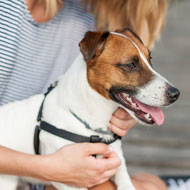Dogs may mirror owners’ anxiety, study shows

High cortisol variability, which is linked to more effective stress management, was found in dogs with owners that scored highly for ‘tolerability’.
Dogs may mirror the anxiety and negative expectations of their owners, according to new research by the University of Vienna.
Researchers tested 132 owners and their dogs to find out how cortisol variability, which is a measure of efficient stress management, is affected by factors such as personality, relationship patterns and gender.
Dog-owner pairings were tested in challenging situations such as games, performance tests and posed threats. Saliva samples were taken before and after to test cortisol levels. Questionnaires also gathered information about the personalities of both owners and dogs, their relationship and interaction style.
High cortisol variability, which is linked to more effective stress management, was found in dogs with owners that scored highly for ‘tolerability’ and low for ‘neuroticism’. The latter is linked to low expectations of social support, major depression and anxiety.
Dogs had poorer stress management (and therefore low cortisol variability) if their owners had an insecure-ambivalent relationship with them.
Commenting, Dr Iris Schoberl of the University of Vienna told BBC News: “Our results fit nicely to experience from practice: owners and dogs are social dyads [a group of two], and they influence each other’s stress coping.”
The findings have been published in the PLOS ONE journal.



 The latest
The latest